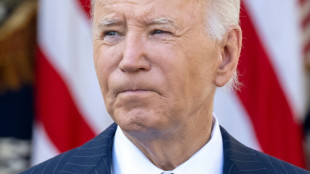Israel to allow food into round operations' after two month blockade
Israel will allow a "basic amount" of food into the Gaza Strip, the prime minister's office said Sunday, after facing mounting pressure to lift a total blockade imposed more than two months ago.
The announcement came hours after the military said it had begun "extensive ground operations" in a newly intensified campaign in Gaza, and as Israel and Hamas engaged in indirect talks on a deal to potentially halt the fighting.
Prime Minister Benjamin Netanyahu's office said that at the military's recommendation, "Israel will authorise the entry of a basic amount of food for the population to ensure that a hunger crisis does not develop in the Gaza Strip".
Such a crisis would jeopardise the army's new operation, it said, adding Israel would "act to prevent Hamas from seizing this humanitarian aid".
Israel said its blockade since March 2 was aimed at forcing concessions from the Palestinian militant group, but UN agencies have warned of critical shortages of food, clean water, fuel and medicines.
Last week US President Donald Trump, a critical ally, acknowledged that "a lot of people are starving", adding "we're going to get that taken care of".
French Foreign Minister Jean-Noel Barrot called on Israel following the latest announcement, to allow the "immediate, massive and unhampered" resumption of aid.
Israel's military announced on Sunday that troops had "begun extensive ground operations throughout the northern and southern Gaza Strip", and were "currently being deployed in key positions".
The ramped-up campaign, which Israel says aims to free hostages and defeat Hamas, started Saturday as the two sides entered indirect talks in Qatar on a deal.
Netanyahu's office said negotiators Doha were "working to exhaust every possibility for a deal -- whether according to the Witkoff framework or as part of ending the fighting".
Steve Witkoff is the US Middle East envoy who has been involved in discussions.
Netanyahu's statement said a deal "would include the release of all the hostages, the exile of Hamas terrorists, and the disarmament of the Gaza Strip".
Since a two-month ceasefire collapsed in March as Israel resumed its offensive, negotiations mediated by Qatar, Egypt and the United States have failed to make a breakthrough.
Netanyahu has opposed ending the war without Hamas's total defeat, while Hamas has balked at handing over its weapons.
A Hamas source familiar with the negotiations said the group was willing "to release all Israeli hostages in one batch, provided that a comprehensive and permanent ceasefire agreement is reached", but Israel "wants to release its prisoners in one batch or in two batches in exchange for a temporary truce".
- 'Working toward' a deal -
Speaking to troops in Gaza Sunday, Israeli army chief Eyal Zamir said the military would "provide flexibility to the political echelon to advance any hostage deal".
"A hostage deal is not a halt, it is an achievement. We are actively working toward it," he said.
Air raid sirens sounded in southern Israel on Sunday afternoon and the army said one of two projectiles launched from Gaza had been intercepted.
The military later issued an evacuation order for several parts of Gaza ahead of an attack, warning it would "launch a powerful strike on any area used for launching rockets".
On the ground, Gaza civil defence spokesman Mahmud Bassal told AFP at least 50 people had been killed as of Sunday afternoon "as a result of ongoing Israeli air strikes since the early hours".
He said 22 people died and at least 100 others were wounded in one attack on tents sheltering displaced Palestinians in Al-Mawasi in the southern Gaza Strip.
AFPTV footage showed people sifting through ruined shelters and rescuers treating the wounded.
"All my family members are gone. There is no one left," said a distraught Warda al-Shaer.
"The children were killed as well as their parents. My mother died too, and my niece lost her eye."
The military said in a statement that a "preliminary wave" of strikes over the past week had hit "over 670 Hamas terror targets throughout the Gaza Strip".
- Hospitals 'out of service' -
Marwan al-Hams, director of field hospitals at Gaza's health ministry, told AFP that since Israel's aid blockade began, "57 children have died in Gaza as a result of famine", adding the number could rise as supplies ran out.
AFP was not able to independently verify the figure.
The UN had warned of the risk of famine in Gaza before the aid blockade was imposed.
The health ministry also accused Israel Sunday of besieging the Indonesian Hospital in Beit Lahia, cutting off access and "effectively forcing the hospital out of service", leaving the north without a functioning public hospital.
Hamas's October 2023 attack that triggered the war resulted in the deaths of 1,218 people on the Israeli side, mostly civilians, according to an AFP tally based on official figures.
Hamas also took 251 hostages during the attack, 57 of whom remain in Gaza, including 34 the military says are dead.
Gaza's health ministry said Sunday at least 3,193 people have been killed since Israel resumed strikes on March 18, taking the war's overall toll to 53,339.
U.Schmid--BP


